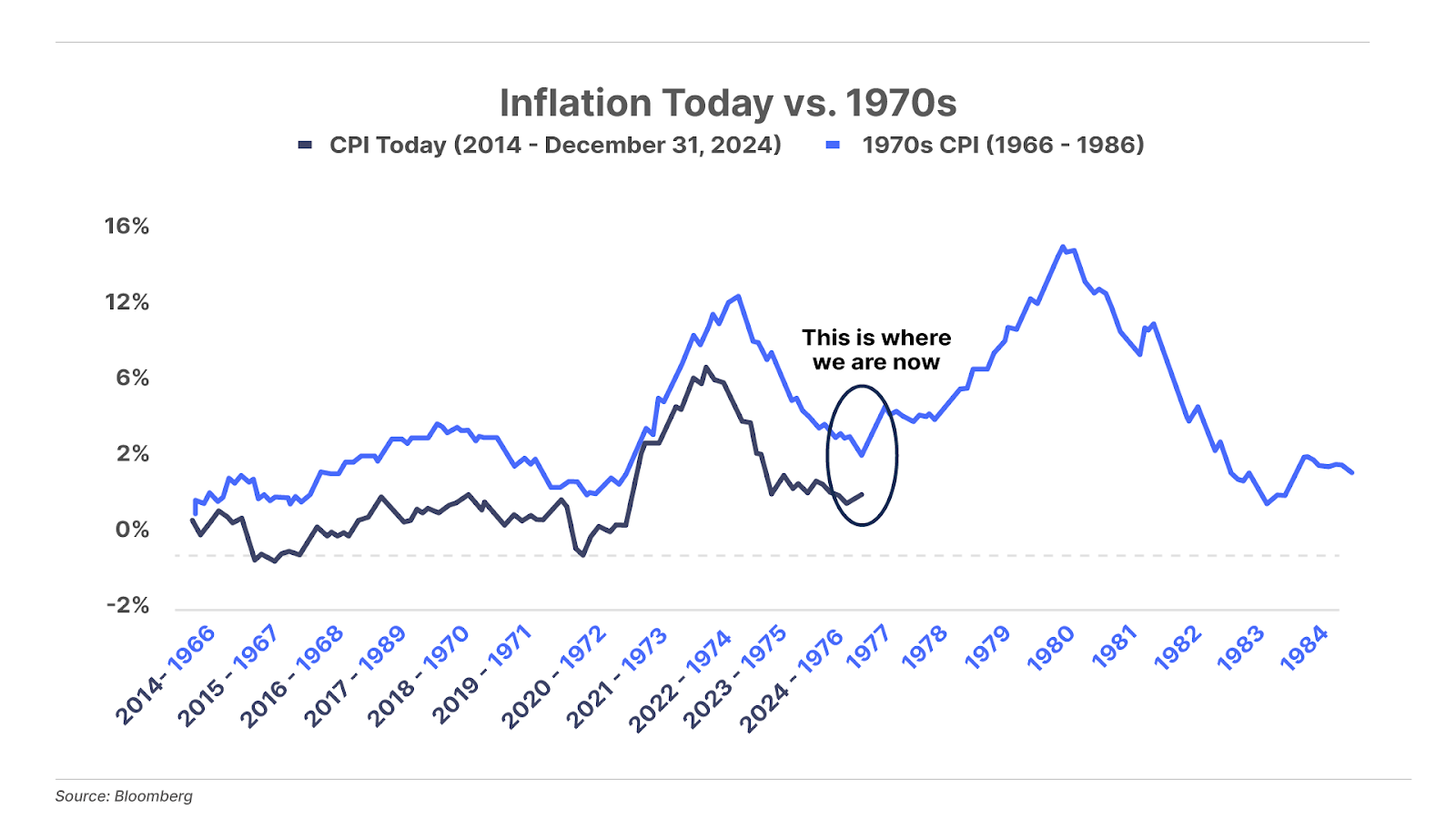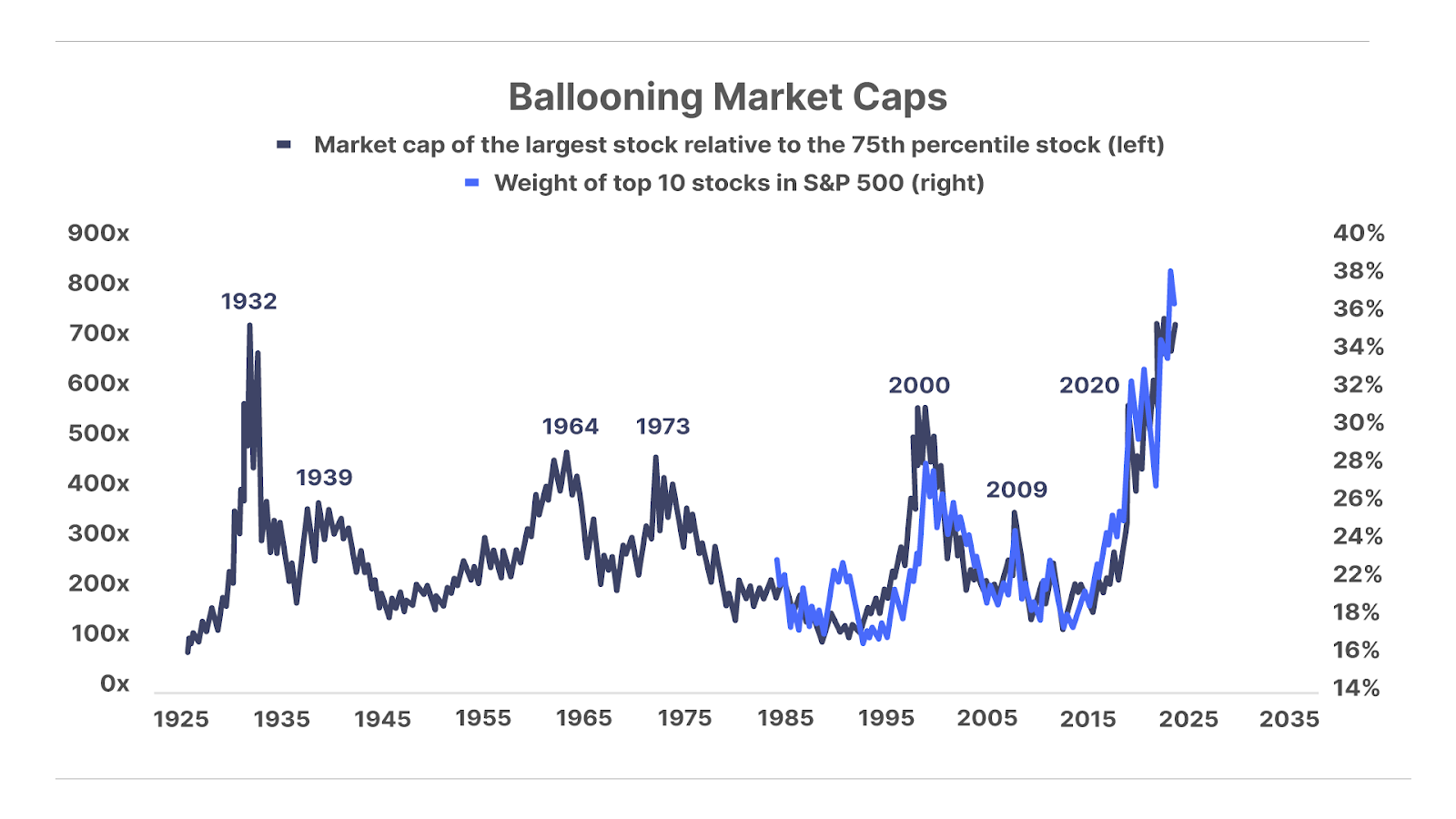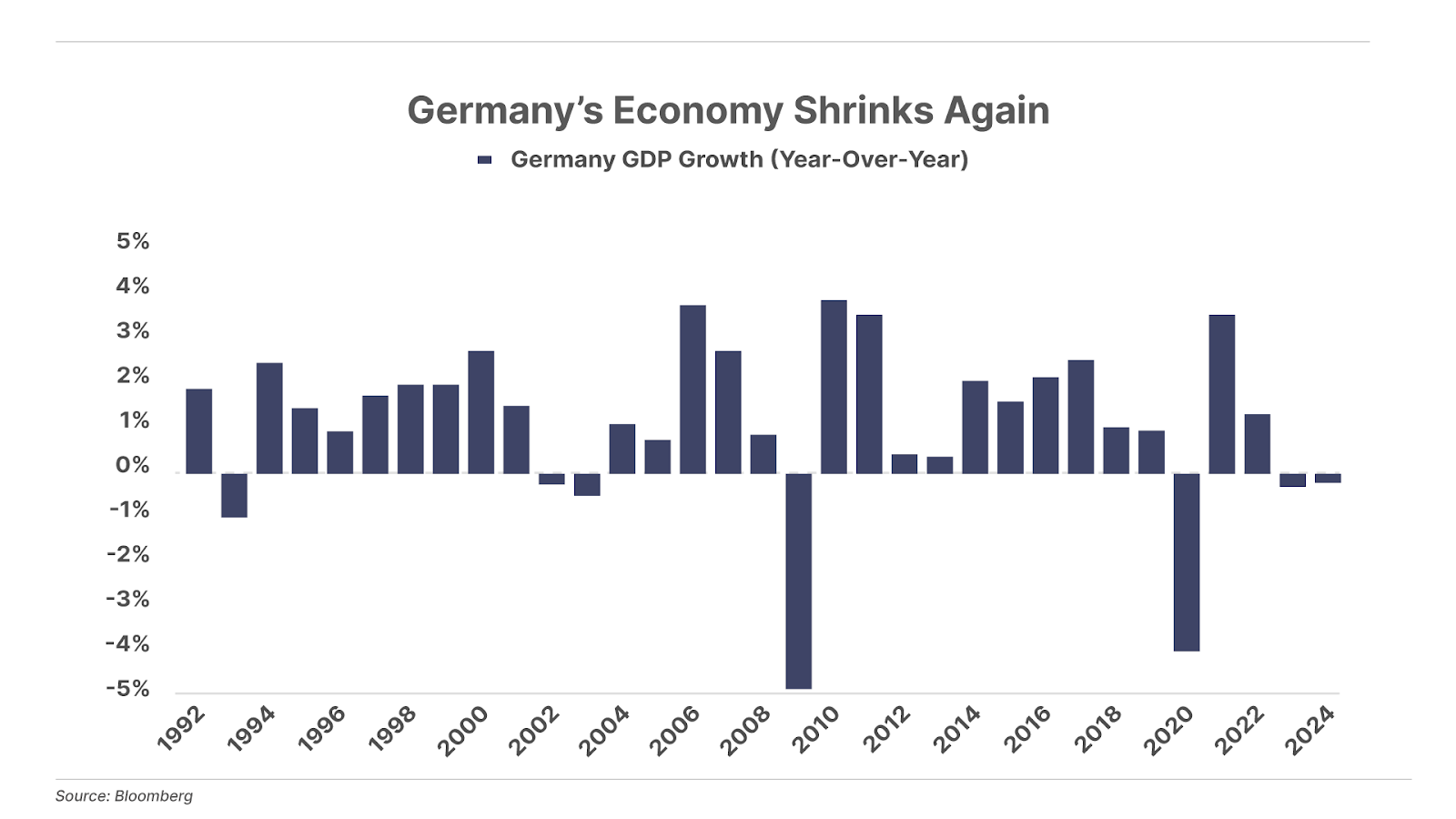Issue #5, Volume #2


Why Tariffs Are The Worst Kind Of Taxes
This is Porter & Co.’s free e-letter, the Daily Journal. Paid-up members can access their subscriber materials, including our latest recommendations and our “3 Best Buys” for our different portfolios, by going here.
Three Things You Need To Know Now:
1. Markets cheer lower inflation. This morning, the Bureau of Labor Statistics reported that consumer inflation (CPI) – excluding food and energy prices – slowed to 3.2% year over year in December, versus Wall Street expectations of 3.3%. Equity markets moved higher on hopes that lower inflation could prompt the Federal Reserve to cut rates this year more than currently forecast. However, inflation including food and energy prices – among the biggest expenses for many consumers – hit a higher-than-expected 2.8% year over year in December versus expectations of 2.7%, and continues to follow a remarkably similar path as the 1970s.

2. Equity market concentration reaches 100-year highs. The market cap of the largest stock in the market – Apple (AAPL) – is more than 700x larger than the 75th percentile stock, the greatest extreme since 1932. Similarly, the market cap weighting of the top 10 stocks in the S&P 500 has soared above 36%, the highest reading since 1925. Growing fears of concentration risk saw investors pour a record $14.4 billion into the Invesco S&P 500 Equal Weight ETF (RSP) – a fund that invests equally across each constituent of the S&P 500 – over the second half of 2024.

3. Germany’s economy shrank… again. Germany’s GDP declined by 0.2% in 2024 after a 0.3% drop in 2023, marking the second two-year contraction since the 1950s. Europe’s largest economy faces a number of challenges, including sluggish consumer spending, rising energy costs, and global competition squeezing out German exports. Unemployment is climbing, while industrial production remains 10% below its 2020 peak – a sign of prolonged weakness. Investors searching for an alternative to the U.S. markets will find little enticing in Germany.

And one more thing…
The term premium – the extra yield investors demand in order to take on the risk of longer-term debt – on 10-year Treasuries is at a decade (plus) high. That means that the market is increasingly wary of lending the U.S. government money for the next 10 (and more) years. Growing federal deficits are adding to the existing $36.3 trillion in U.S. federal debt, and there is no actual plan to balance the federal budget (and any politician who suggests one would be voted out immediately). Thus there are two options: Default, or give in to higher inflation. The upshot: The term premium is going up… and up, and up.

Coming up…
In tomorrow’s issue of The Big Secret on Wall Street, we’re making our first recommendation of 2025… a household name with an unassailable moat that’s trading at a big discount – and management is buying back shares. It’s a classic Big Secret stock that is the perfect place to invest money – and then forget about it, for generations. If you’re not already a paid-up subscriber to The Big Secret on Wall Street, click here to learn more… or call Lance James, our Director of Customer Care, at 888-610-8895 or internationally at 1+ 443-815-4447.
Trump To The Rest Of The World: Drop Dead
Why Tariffs Are The Worst Kind Of Taxes
It’s a solution only a demagogue would love.
In a recent social media post, President-elect Donald Trump says he’s going to create a new federal revenue agency, the “External Revenue Service.”
The name shows he doesn’t know much about history: America already established an external revenue service.
The Revenue Cutter Service was established by President George Washington in 1790. And the first revenue sailing vessel built was The Massachusetts, commissioned in 1791.
Congress granted extraordinary powers to this branch of the government. Among other things, Revenue Cutters were entitled to search any vessel without probable cause. Yes, that’s a clear violation of the Fourth Amendment – “protecting people from unreasonable searches and seizures.” But, the Supreme Court has consistently upheld these privileges as necessary to the Revenue Cutters because of their role in generating revenue for the government. Or, in other words, our civil rights – supposedly granted by God, our creator – don’t count when they interfere with the government’s right to confiscate our property.
Hmmm… Maybe those lofty words about “establishing a more perfect union,” etc., were just propaganda. In fact, Cutters’ extraordinary powers were most recently upheld in a 1983 Supreme Court case (United States v. Villamonte-Marquez).
But wait, the Revenue Cutters were abolished in 1915 – the service became the U.S. Coast Guard, whose mission was (supposedly) to aid coastal navigation and mariners. Why would they need the right to ignore the Fourth Amendment? Well, as the only agency legally entitled to search whatever it wants, whenever it wants, the government wasn’t about to let the Coast Guard go to waste! It became the government’s primary weapon in the “war on drugs.”
(By the way, I believe we should refer to “war on drugs” as The First Pointless And Unwinnable War Against Human Nature, which was followed by The Second Pointless And Equally Unwinnable War Against Climate Change.)
Now, it seems that Trump plans to use these incredible extra-Constitutional powers, once again, to collect revenue for the nation. And, ironically, this has his most ardent libertarian-leaning supporters excited! They believe Trump’s moronic claim that the External Revenue Service will enable America to tax foreigners, instead of taxing our own citizens.
First of all, if that’s his plan, then I’d suggest he at least shut down the Internal Revenue Service (the IRS) first. (Watch: that won’t happen.)
And, more importantly, most people who can read and think (and who choose to do so) realize there’s no practical way to tax businesses or our trading partners. These costs must be passed along to the ultimate consumers – us. If the cost of the additional tax renders the business (or the trade) unprofitable, then it will simply cease.
Wonderful, you may think. That will open opportunities for American businesses. America first! Well, be careful what you wish for. There are millions of things Americans, and the U.S. economy, either aren’t any good at (because of supply chains, labor rates, culture, climate, natural resources) or, even worse, have very low returns on capital (stuff we don’t want to be any good at).
These economic realities (known to economists as comparative advantage) explain why global trade is so important to increasing wealth and living standards all around the world. There’s a reason nobody tries to grow bananas in Iceland. Doing so won’t make Iceland richer – it will make it poorer, as the energy and effort will be supremely inefficient and take capital and resources away from where they can be profitably employed.
It is unbelievably naïve (and stupid) to believe that trade enriches one country at the expense of the other. Instead, both parties gain – or else the transactions would not occur. And today the links between various economies are extremely intricate and important to the function of all the major economies.
As one example, while it’s true that America is producing a lot of crude oil, most of it is “light sweet” crude. But our refineries – that make gasoline – were designed and built to process heavier crudes, much of which we import from Canada. So, if you think we’re going to enrich ourselves by impoverishing Canada with a 25% tariff, you’re a moron: all of those costs will be passed along to you, the consumer. Meanwhile, a wholesale tariff at that level will simply destroy the economics of all kinds of supply chains, making the U.S. economy vastly less efficient. That will make everyone – us and our trading partners – poorer.
What we should want is for Canada (and any other trading partner) to become wealthier by making us wealthier – by everyone doing what they are best at and keeping the goddamn government out of the way.
What people all around the world need is vastly less government, not borders we can’t cross and goods and labor we can’t exchange fairly.
Think about it this way. Why aren’t there tariffs between states? According to Trump, Florida would be wealthier if it charged tariffs against the smaller economies in Georgia and Alabama. Those smaller states have been “living” off Florida buying cheap vacations from them for decades. It’s time they paid their fair share!
Does that make any sense? Of course not.
Neither does the completely nonsense idea that we can tax (or tariff) our way to prosperity.
A president threatening to set up a second revenue agency for the federal government isn’t good news. It’s horrifying.
Let me know what you think by sending comments to [email protected]
Good investing,
Porter Stansberry
Stevenson, MD
Mailbag
Today’s letter is from S.G., who writes…
Erez Kalir’s Biotech Frontiers picks have been like a cheat sheet for making money. Seriously, at least three triple-digit winners already. Are you kidding me? And that’s from a small list of curated winners.
Thank you so much for the great advice. My gains from Erez’s portfolio have more than paid for my entire Partner Pass several times over. Your service is the best investment I’ve ever made.
You have exceeded my expectations again and again as the many portfolios and the website continue to improve by leaps and bounds.
All the best, S.G.
(To learn more about becoming a subscriber to Biotech Frontiers – the model portfolio rose an extraordinary 41.4% in 2024 – get in touch with Lance… he’s at 888-610-8895.)


P.S. Everyone likes “green days”… that is, when a stock you own is up for the day.
If only you could know – not guess, but know – when a stock is going to have a string of green days… in advance.
I know this sounds crazy. Telling the future, of course, is the ultimate stock market hack.
So at first I didn’t believe it when my friend Keith Kaplan, the CEO of TradeSmith, showed me what he and his team did. Keith called it “the biggest innovation since TradeStops launched in 2005.”
I’ve known Keith for years. I use his other investing tools, like TradeStops – and Porter & Co. uses it to compute portfolio returns. I have a huge amount of confidence in what Keith and his team do.
So when I say that Keith has figured out “green days” (or “zones”)… I don’t say it lightly. I had to be convinced.
And I am convinced. Keith has figured out the “seasons” of when a stock is about to enter a green zone. For example…
- NVIDIA (NVDA), the high-flying chipmaker that became a household name thanks to AI, historically rises by an average of 7.8% over 15 days starting October 24. And there’s a 100% success rate for that statistic over 15 years.
- The popular energy drink company, Monster Beverage (MNST), enters a green zone every April 14, delivering average gains of 4.7% in 20 days – 87% of the time.
- And Amazon (AMZN) gains an average of 4% over 15 days starting November 13, with an 86% success rate.
The TradeSmith team back tested seasonal signals on thousands of stocks since 2006, as a rolling 15-year lookback, to come up with data like this. That’s 33 years of data. Billions upon billions of rows of price information.
And they’ve filtered out the noise – lots of noise – to deliver astonishingly powerful data.
Again… I know this sounds unbelievable. Earlier this week I sat down with Keith… because, like I said, I was doubtful. Our conversation is here. I urge you to watch… maybe you’ll be as shocked as I was.